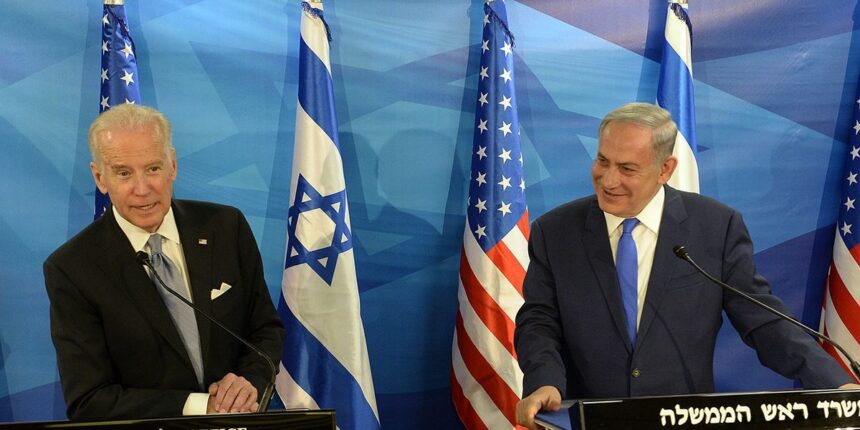Summary by Geopolist | Istanbul Center for Geopolitics:
The article discusses the tension between the Biden administration and Israeli Prime Minister Netanyahu regarding Israel’s potential military action against Hezbollah in Lebanon. The U.S. is concerned about the risk of a broader conflict in the region. Biden is pushing for restraint and dialogue, while Netanyahu is under pressure domestically to take a hard stance. The situation is complicated by Iran’s influence in Lebanon and the upcoming U.S. presidential election. The article emphasizes the importance of diplomacy to avoid escalation.
For more details, you can read the full article here below.
As hopes for a Gaza ceasefire continue to fade, the threat of a full-blown war between Israel and Hezbollah is now greater than at any time since October 7.
Following the release of a Hezbollah video shot by surveillance drones over various targets in northern Israel, Israeli officials warned of “an all-out war” in which Hezbollah will be destroyed and Lebanon would be sent “back to the Stone Age.” Not to be outdone, Hezbollah chief Hassan Nasrallah is threatening a war with “no restraint and no rules and no ceilings.”
Such a war would be catastrophic for Lebanese and Israeli civilians alike, and risks drawing Iran into wider conflict that engulfs the entire region. It would also instantly unravel what had been one of the Biden administration’s few achievements since October 7 — preventing a full-blown regional war.
Even as the Israel-Lebanon front heats up, however, the most serious threats to de-escalation in Lebanon and to prospects for a Gaza ceasefire come from the Biden administration itself.
One need only look at realities in Gaza, where nearly nine months of war have cost the lives of more than 37,000 Palestinians, the vast majority of them women and children, and reduced most of Gaza to rubble. Despite putting forward a comprehensive ceasefire plan, which now has the backing of the United Nations Security Council, the Biden administration has done little to alter the basic cost-benefit calculations of either side — particularly Israel’s.
Despite the massive death and destruction inflicted on Gaza, Hamas’s command and control remains intact while Israel still has no signal achievement by which to claim victory. Moreover, Israeli Prime Minister Benjamin Netanyahu, as is widely understood, has a personal interest in prolonging the war for as long as possible in order to maintain his grip on power (and hence also avoid going to jail).
Despite the administration’s assertions that only Hamas stands in the way of a ceasefire, even Netanyahu has dropped the pretense, noting that “we are committed to continue the war after the pause in order to achieve the goal of destroying Hamas. I will not give up on this.” For its part, Hamas has little incentive to go along with a ceasefire deal that does not actually lead to an end of the war. And despite Biden’s pledge to hold Israel to its commitments, the administration’s record over the last several months hardly inspires confidence.
Instead of attempting to change the incentive structure of both sides, the Biden administration has consistently worked to absorb, deflect or otherwise offset any potential costs or consequences that Israel could incur by continuing the war, thereby prolonging it. Despite serious and growing differences between the U.S. and Israel over both its conduct and goals of the war, the administration has continued to provide nearly unrestricted military, political and diplomatic support for Israel’s military campaign at virtually every stage—regardless of the costs for Palestinians and even when it has strongly disagreed with those actions.
The list of examples is as long as it is disturbing — from the administration’s endless, and largely unheeded, pleas for Israel to do more to limit civilian casualties, scale back its “indiscriminate” bombing, allow more humanitarian aid to Gaza’s starved population, and lay out a clear post-war endgame for Gaza, to the President’s supposed “red line” in Rafah, which Netanyahu has blown through as effortlessly as he did previous ultimatums by the administration.
With the exception of holding up a single shipment of the 2,000 and 500-pound bombs that had already killed thousands of innocents and annihilated most of Gaza’s infrastructure, Biden has kept the weapons flowing, despite the administration’s own assessment that U.S. weapons were likely used by Israel in violation of international humanitarian law.
Not only has Netanyahu avoided paying a price for his defiance of the U.S., the administration has continued to reward him and his far-right government with virtually unrestricted military, political, and diplomatic support. Even when Netanyahu publicly accused the administration of holding back weapons, the White House rushed to clarify that apart from the one shipment there was no disruption in the flow of weapons.
Congress has only amplified Netanyahu’s political impunity with its bipartisan invitation for him to deliver a joint address to Congress this month, a move many Israelis, including former prime minister Ehud Barak, have decried as a “terrible mistake”.
In announcing his ceasefire plan, which the U.S. slyly sought to couch as an Israeli proposal, Biden made it a point to declare Hamas no longer had the ability to carry out another October 7 and that it was “time for this war to end,” thus offering Netanyahu a victory narrative and a ledge from which to climb down from his impossible perch of “total victory” and destroying Hamas—an offer the Israeli premier has pointedly declined, in large part because he understands there is no price to pay for doing so.
Among other things, this has put the Biden administration in the awkward position of continuing to provide material support for a war that, for all intents and purposes, it no longer supports politically. This fundamental contradiction lies at the core of the repeated ceasefire failures in Gaza as well as the escalation on the Israeli-Lebanese front.
The same muddled message to Israel–“we’d rather you didn’t, but we’ll still back you up when you do”— which may be the closest thing we’ve seen yet to a Biden Doctrine — is now being extended to Lebanon. The administration has warned Israel against an all-out invasion of Lebanon or “small regional war,” which risks drawing Iran into an even wider and more catastrophic regional conflict, and has intensified its diplomatic efforts to forestall such an outcome.
As Israel and Hezbollah have inched ever closer toward blown-blown war, however, the administration has shifted its messaging, assuring Israeli leaders that the U.S. will continue to back Israel militarily even in the event of a full-scale war while at the same time warning Hezbollah that U.S. cannot prevent Israel from mounting a full-scale invasion.
What better way to undercut U.S. diplomacy than by reinforcing Netanyahu’s preference for military solutions over diplomatic ones.
This basic contradiction stems from the administration’s belief that differences or difficulties in the U.S.-Israel relationship serve as motivation for Hezbollah, Hamas and other members of the “axis of resistance” to continue and expand the fighting, and thus that the best deterrent is to eliminate any public daylight between the United States and Israel. As the past nine months (if not several decades) have shown, however, precisely the opposite is true — the provision of virtually restricted weapons and diplomatic support reduces the costs of continued military action for Israel and encourages reckless behavior, such as we have seen throughout the Gaza war.
As Israel’s chief political enabler and weapons supplier, the United States absolutely has the ability — even a responsibility — to constrain Israel from taking actions that directly harm broader U.S. interests, as both an attack on Lebanon and the lack of a ceasefire in Gaza both do.
But for reasons of both domestic politics and the president’s own deeply held personal views, the Biden administration has chosen not to use its substantial leverage.
The Biden administration no doubt understands that the surest way to prevent a further escalation in Lebanon is to end the horrific war in Gaza, though it has failed to grasp its own role in fueling both of these. For the U.S. to bring about an end to the Gaza war and prevent an equally disastrous regional war, this will have to change, including most notably by withholding the political and military support Israel’s far-right government needs to sustain the war in Gaza or expanding it to Lebanon.
As long as the U.S. persists in absorbing or deflecting Israel’s costs for maintaining the war, not only will the horrors in Gaza continue but may only be a matter of time before extending the devastation to Lebanon as well.
By: KHALED ELGINDY
Source: responsiblestatecraft.org







